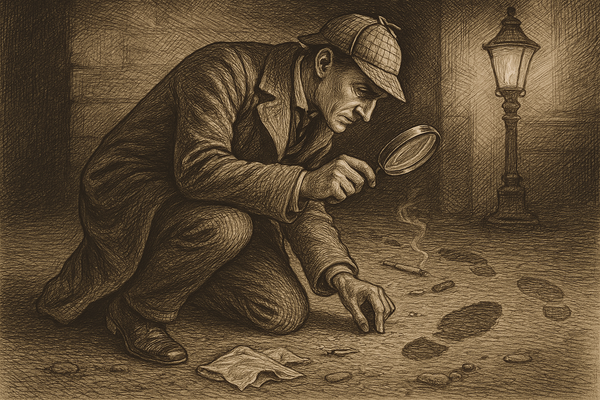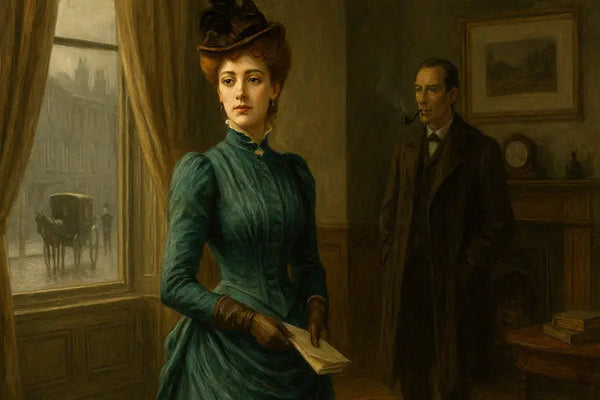Step into the unparalleled world of Sherlock Holmes as we unravel the enigmatic mysteries that surround this iconic literary figure. In this article, "Unleashing the Detective Genius: Answering the Top 10 FAQs About Sherlock Holmes," we delve into the questions that have captivated fans and curious minds alike.
Who is Sherlock Holmes?
Sherlock Holmes is a fictional detective created by Sir Arthur Conan Doyle. He first appeared in Doyle's "A Study in Scarlet," published in Beeton’s Christmas Annual in 1887, and has since become one of the most recognisable and enduring characters in literature. Holmes is known for his exceptional deductive reasoning skills, keen observation, and ability to solve even the most perplexing cases. With his iconic deerstalker hat, pipe, and magnifying glass, Holmes has become a symbol of detective genius.
The origins of Sherlock Holmes
Sir Arthur Conan Doyle, a Scottish writer and physician, created Sherlock Holmes as a way to showcase his own fascination with deductive reasoning and detective work. Doyle drew inspiration from real-life figures such as Dr. Joseph Bell, a surgeon known for his remarkable diagnostic abilities. However, Holmes' character is not an exact replica of any one person, but rather a combination of various influences.
Doyle initially struggled to find a publisher for his first Sherlock Holmes novel, but once it was released, it quickly gained popularity and established Holmes as a beloved character. Doyle went on to write three more novels and 56 short stories featuring Holmes, cementing his place in literary history.
The most popular Sherlock Holmes stories
Some of the most popular Sherlock Holmes stories include "A Scandal in Bohemia," "The Adventure of the Speckled Band," "The Hound of the Baskervilles," and "The Final Problem." These stories showcase Holmes' deductive prowess and introduce readers to his loyal sidekick, Dr. John Watson. The stories often follow a similar format, with Holmes being presented with a seemingly unsolvable mystery and using his brilliant mind to unravel the truth.
"The Hound of the Baskervilles" is perhaps one of the most famous Holmes stories, featuring a supernatural element and a suspenseful narrative. It is a testament to Doyle's ability to blend genres and keep readers on the edge of their seats. These stories have captivated audiences for over a century and continue to be celebrated for their intricate plots and memorable characters.
What makes Sherlock Holmes a genius detective?
Sherlock Holmes' genius lies in his exceptional powers of observation and deduction. He is able to notice even the smallest details that others may overlook, and from these observations, he can draw accurate conclusions. Holmes' keen eye for detail allows him to solve cases that seem unsolvable to others.
In addition to his observational skills, Holmes possesses an encyclopaedic knowledge of various subjects, ranging from chemistry to literature. This vast knowledge allows him to make connections and draw upon relevant information when solving cases. Holmes' ability to think outside the box and consider all possibilities also contributes to his success as a detective.
The methods and techniques used by Sherlock Holmes
Sherlock Holmes employs a variety of methods and techniques in his detective work. One of his most famous tools is his magnifying glass, which he uses to examine crime scenes and objects for minute details. Holmes also relies heavily on his powers of deduction, using logic and reasoning to piece together the clues and solve mysteries.
Holmes often adopts disguises to gather information and move around unnoticed. He is skilled in the art of disguise, able to transform his appearance and assume different personas. This allows him to blend into various social circles and gather valuable information that may help solve the case.
Additionally, Holmes is an expert in forensic science, utilising techniques such as fingerprint analysis and bloodstain pattern analysis to gather evidence. He is also known for his ability to read people's body language and facial expressions, which helps him to uncover hidden truths.
Sherlock Holmes and his famous sidekick, Dr. John Watson Dr.
John Watson serves as Sherlock Holmes' trusted friend and loyal assistant throughout many of the detective's adventures. Watson acts as the narrator in most of the stories, providing readers with insight into Holmes' methods and thought processes.
Watson, a former army doctor, is often portrayed as the more practical and down-to-earth counterpart to Holmes' eccentric genius. He is amazed by Holmes' abilities and serves as a sounding board for the detective's ideas and deductions. Watson's presence humanises Holmes and adds depth to their dynamic partnership.
The impact of Sherlock Holmes on popular culture
Sherlock Holmes has had a profound impact on popular culture, influencing countless detective stories, films, TV shows, and even video games. The character has become synonymous with the archetype of the brilliant detective, inspiring the creation of numerous fictional sleuths.
The enduring popularity of Sherlock Holmes can be attributed to his timeless appeal and the enduring quality of Doyle's writing. Holmes' adventures continue to captivate audiences and inspire new generations of readers and viewers. The character has also become an icon, representing the power of intellect and deduction.
Frequently asked questions about Sherlock Holmes' abilities
Can Sherlock Holmes really solve crimes just by observing? How does Holmes manage to deduce so much from seemingly inconsequential details? Is Holmes' character based on a real detective? Are there any limits to Holmes' abilities? How does Holmes' deductive reasoning work? Can anyone learn to be as observant and deductive as Sherlock Holmes? Does Holmes ever get things wrong? Does Holmes have any weaknesses or vulnerabilities? How does Holmes' drug use affect his abilities? Can Holmes really remember every detail about every case he has solved? Debunking common misconceptions about Sherlock Holmes There are several common misconceptions about Sherlock Holmes that have persisted over the years. One of the most prevalent is the idea that Holmes is a cold and detached character who lacks emotions. In reality, Holmes is shown to have a range of emotions, although he often suppresses them in favour of logic and reason.
Another misconception is that Holmes is a master of disguise. While he does frequently use disguises to gather information, he is not a master of physical transformation. Rather, he relies on his ability to blend in and adopt different personas to achieve his objectives.
It is also often believed that Holmes is infallible and never makes mistakes. However, there are instances in the stories where Holmes makes errors in judgment or fails to solve a case. These mistakes humanise Holmes and remind readers that even the greatest detective is not immune to failure.
Conclusion
The enduring legacy of Sherlock Holmes Sherlock Holmes' enduring legacy is a testament to the power of compelling storytelling and the timeless appeal of a brilliant detective. From his origins in the mind of Sir Arthur Conan Doyle to his impact on popular culture, Holmes continues to captivate and inspire audiences worldwide.
Through his exceptional deductive reasoning, keen observation, and unique methods, Sherlock Holmes has become a symbol of detective genius. His stories have stood the test of time, attracting new generations of fans and ensuring that Holmes remains a beloved and iconic character.
So, step into the world of Sherlock Holmes and let his mysteries unravel before your eyes. Explore the enigmatic mind of this master detective and discover why he continues to fascinate readers, transcending time and captivating imaginations. Unleash your own detective genius and join the ranks of those who have been captivated by the brilliance of Sherlock Holmes.
















































